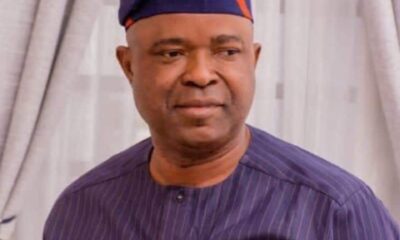News
World leaders pay tribute to Gorbachev, last rare leader of USSR, who dies at 91

World leaders have paid tribute to Mikhail Gorbachev, the Soviet leader who oversaw the collapse of the USSR and lifted the Iron Curtain, marking a pivotal turning point in world history.
Gorbachev, Nobel prize winner, who ended the Cold War without bloodshed but failed to prevent the collapse of the Soviet Union, died on Tuesday at the age of 91, hospital officials in Moscow said.
The passing of Mikhail Gorbachev, the last leader of the Soviet Union and for many the man who restored democracy to then-communist-ruled European nations, was mourned Wednesday as the loss of a leader who changed the world and for a time gave hope for peace among the superpowers.
Here are some of the reactions to his death from across the world.
Russian President Vladimir Putin
Russia’s leader Vladimir Putin expressed his “deep sympathies” over Gorbachev’s death, Kremlin spokesman Dmitry Peskov told Russian news agencies.
“Tomorrow he will send a telegram of condolences to his family and friends,” said Peskov.
UN chief Antonio Guterres
Guterres in a statement praised Gorbachev as “a one-of-a-kind statesman who changed the course of history” and “did more than any other individual to bring about the peaceful end of the Cold War”.
The statement, which was posted on Twitter, said the world has lost “a towering global leader, committed multilateralist and tireless advocate for peace”.
French President Emmanuel Macron
Macron praised Gorbachev as a “man of peace” and sent his “condolences for the death of Mikhail Gorbachev, a man of peace whose choices opened up a path of liberty for Russians. His commitment to peace in Europe changed our shared history”.
US President Joe Biden
Biden hailed Gorbachev as a “rare leader” who made the world a safer place.
“These were the acts of a rare leader – one with the imagination to see that a different future was possible and the courage to risk his entire career to achieve it,” Biden said in a statement, referring to Gorbachev’s democratic reforms.
“The result was a safer world and greater freedom for millions of people. Mikhail Gorbachev was a man of remarkable vision,” Biden added.
EU chief Ursula von der Leyen
European Commission President Ursula von der Leyen hailed Gorbachev as a “trusted and respected leader” who “opened the way for a free Europe”.
His “crucial role” in bringing down the Iron Curtain, which symbolised the division of the world into communist and capitalist blocs, and ending the Cold War left a legacy “we will not forget”, she wrote on Twitter.
UK Prime Minister Boris Johnson
Outgoing Prime Minister Boris Johnson said he “always admired the courage and integrity” Gorbachev showed to bring the Cold War to a peaceful conclusion.
“In a time of Putin’s aggression in Ukraine, his tireless commitment to opening up Soviet society remains an example to us all,” he said in a Twitter post, referring to Moscow’s offensive in its former Soviet neighbour.
Japanese Prime Minister Fumio Kishida
Kishida noted Gorbachev’s important role in the reduction of nuclear weapons held by the Soviet Union and United States, saying he had made “great achievements.”
“Mr. Gorbachev, who possessed great strategic vision and decisive execution, played a very important role,” he said.
Gorbachev, the last Soviet president, forged arms reduction deals with the United States and partnerships with Western powers to remove the Iron Curtain that had divided Europe since World War Two and bring about the reunification of Germany.
But his internal reforms helped weaken the Soviet Union to the point where it fell apart, a moment that President Vladimir Putin has called the “greatest geopolitical catastrophe” of the twentieth century.
After decades of Cold War tension and confrontation, Gorbachev brought the Soviet Union closer to the West than at any point since World War Two.
“He gave freedom to hundreds of millions of people in Russia and around it, and also half of Europe,” said former Russian liberal opposition leader Grigory Yavlinsky. “Few leaders in history have had such a decisive influence on their time.”
But Gorbachev saw his legacy wrecked late in life, as the invasion of Ukraine brought Western sanctions crashing down on Moscow, and politicians in both Russia and the West began to speak of a new Cold War.
“Gorbachev died in a symbolic way when his life’s work, freedom, was effectively destroyed by Putin,” said Andrei Kolesnikov, senior fellow at the Carnegie Endowment for International Peace.
He will be buried in Moscow’s Novodevichy Cemetery next to his wife Raisa, who died in 1999, said Tass, citing the foundation that the ex-Soviet leader set up once he left office.
“We are all orphans now. But not everyone realizes it,” said Alexei Venediktov, head of a liberal media radio outlet that closed down after coming under pressure over its coverage of the Ukraine war.
When pro-democracy protests rocked Soviet bloc nations in communist Eastern Europe in 1989, Gorbachev refrained from using force – unlike previous Kremlin leaders who had sent tanks to crush uprisings in Hungary in 1956 and Czechoslovakia in 1968.
But the protests fuelled aspirations for autonomy in the 15 republics of the Soviet Union, which disintegrated over the next two years in chaotic fashion.
Gorbachev – who was briefly deposed in an August 1991 coup by party hardliners – struggled vainly to prevent that collapse.
“The era of Gorbachev is the era of perestroika, the era of hope, the era of our entry into a missile-free world … but there was one miscalculation: we did not know our country well,” said Vladimir Shevchenko, who headed Gorbachev’s protocol office when he was Soviet leader.
On becoming general secretary of the Soviet Communist Party in 1985, aged just 54, he had set out to revitalise the system by introducing limited political and economic freedoms, but his reforms spun out of control.
“He was a good man – he was a decent man. I think his tragedy is in a sense that he was too decent for the country he was leading,” said Gorbachev biographer William Taubman, a professor emeritus at Amherst College in Massachusetts.
-FRANCE 24 with AFP, AP and Reuters
News
Tinubu not telling Nigerians the truth, says Sule Lamido

Tinubu not telling Nigerians the truth, says Sule Lamido
President Bola Tinubu has been accused of not being forthright about the true state of Nigeria under his administration.
Former Jigawa State Governor and senior Peoples Democratic Party (PDP) member, Sule Lamido, made the accusation while speaking on the BBC Hausa programme Gane Mini Hanya.
Lamido criticized both Tinubu and former President Muhammadu Buhari for what he described as a lack of transparency in governance.
“Buhari’s and Tinubu’s governments are not being transparent with Nigerians unlike during the time when PDP was in power where everything was transparent and open to all Nigerians,” Lamido said.
READ ALSO:
- Odili: Fubara prevented Wike from turning Rivers to private estate
- Putin apologises over Azerbaijan plane crash reportedly shot down
- 256 terrorists, two logistics suppliers arrested in one week – DHQ
He accused the two administrations of relying on propaganda rather than providing citizens with accurate information.
Lamido also expressed concerns over President Tinubu’s recent loan requests, questioning the logic behind them. “If Nigerians are being told the truth then there is nothing wrong with that, but how would you budget N30tn, generate N50tn and then request loan when you have a surplus of N20tn,” he said, referencing last year’s budget.
He described the situation as “reckless” and “selfish,” adding, “This recklessness and clear-cut selfishness is not done anywhere in the world, but yet you find (some) Nigerians supporting it. Visit social media and see how APC is being criticised, being referred to as calamity, yet you find some protecting it.”
Tinubu not telling Nigerians the truth, says Sule Lamido
News
Nigeria Customs Service begins 2025 recruitment [How to apply]

Nigeria Customs Service begins 2025 recruitment [How to apply]
The Nigeria Customs Service (NCS) has announced the commencement of its recruitment exercise, assuring Nigerians that the process is entirely free and fair.
The agency has cautioned the public to be vigilant against scammers who may attempt to exploit unsuspecting applicants during the recruitment period.
Applications are invited for positions in the Superintendent, Inspector, and Customs Assistant cadres as part of the Service’s plan to recruit 3,927 officers in 2025.
This initiative is aimed at enhancing trade facilitation and supporting Nigeria’s economic recovery efforts.
“Our recruitment is entirely free and fair. At no stage do we charge fees. Anyone requesting payment is a scammer,” the agency emphasized, urging applicants to be wary of fraudulent schemes.
READ ALSO:
- Dangote, Tinubu, Lookman, Badenoch named among 100 most influential Africans in 2024
- Heavy security in Ilesa as ex-Osun deputy gov emerges new Owa-Obokun
- Hacker has stolen N180m from my NGO account – VeryDarkMan cries out
The NCS outlined eligibility criteria, stating that applicants must be Nigerian citizens by birth, possess a valid National Identification Number (NIN), and have no criminal record or ongoing investigations.
Academic qualifications for the three cadres are as follows:
Superintendent Cadre: A university degree or Higher National Diploma (HND) along with an NYSC discharge or exemption certificate.
Inspectorate Cadre: A National Diploma (ND) or Nigeria Certificate in Education (NCE) from an accredited institution.
Customs Assistant Cadre: At least an O’Level certificate (WAEC or NECO).
In addition to these qualifications, the NCS stressed that all applicants must be physically and mentally fit, providing evidence of medical fitness from a recognized government hospital.
Nigeria Customs Service begins 2025 recruitment [How to apply]
News
Tinubu to critics: I won’t reduce my cabinet size

Tinubu to critics: I won’t reduce my cabinet size
President Bola Tinubu on Monday unequivocally responded to critics who described his cabinet as “bloated” by saying he is unprepared to reduce the size of his 48-man cabinet.
“I am not ready to shrink” the size of my cabinet, Tinubu said during a media chat at his Bourdillon residence in the highbrow Ikoyi area of Lagos State.
“I am not prepared to bring down the size of my cabinet,” the former Lagos governor said, arguing that “efficiency” has been at the core of his selection of ministers.
The president also said he has no regret removing the petrol subsidy in May 2023, saying Nigeria cannot continue to be Father Christmas to neighbouring countries.
READ ALSO:
- Kolawole Erinle: Appeal court affirms sentence for ex-convict over $1.4m fraud
- We’ve forced Lakurawa terrorists back to Mali, says FG
- Petrol: MRS enforces N935 per litre nationwide
“I don’t have any regrets whatsoever in removing petrol subsidy. We are spending our future, we were just deceiving ourselves, that reform was necessary,” he told reporters.
Tinubu appointed 48 ministers in August 2023, three months after his inauguration. The Senate immediately screened and confirmed the ministers. One of the ministers, Betta Edu, was suspended in January while another, Simon Lalong, moved to the Senate.
There were calls for the President to reshuffle his cabinet as many Nigerians have not been impressed by the performance of some of the ministers, especially in the face of unprecedented inflation, excruciating economic situation and rising insecurity.
In October 2024, Tinubu re-assigned 10 ministers to new ministerial portfolios and appointed seven new ministers for Senate confirmation. He also sacked five of his ministers but critics insist that the President’s cabinet remains large, especially with the creation of a Livestock Ministry with a minister.
Tinubu to critics: I won’t reduce my cabinet size
-

 Auto2 days ago
Auto2 days agoLSM MD extols founder’s qualities after latter posthumous industry award
-

 Business3 days ago
Business3 days agoBe creative, monarch, others challenge Muslim professionals on economic revival
-

 Entertainment2 days ago
Entertainment2 days agoMultiChoice announces free access to all DSTV channels for 3 days
-

 metro3 days ago
metro3 days agoJigawa State governor loses son 24 hours after mother’s death
-

 News2 days ago
News2 days agoNigeria Customs Service begins 2025 recruitment [How to apply]
-

 metro2 days ago
metro2 days agoHeavy security in Ilesa as ex-Osun deputy gov emerges new Owa-Obokun
-

 metro2 days ago
metro2 days agoLagos Imam to Tinubu: You haven’t disappointed us
-

 metro2 days ago
metro2 days agoDangote, Tinubu, Lookman named among 100 most influential Africans in 2024 (Full list)













